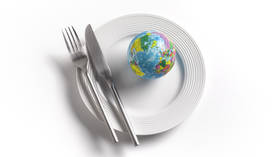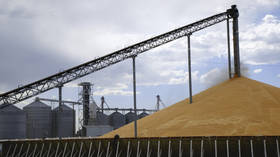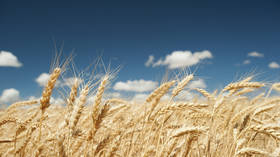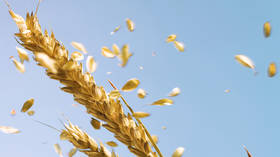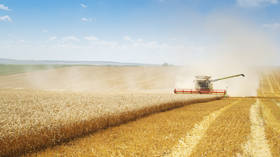Hunger games: How the world's farmers have become collateral victims of sanctions against Russia
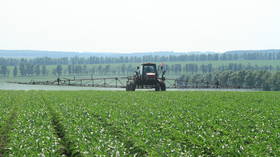
The rush to impose sanctions on Russia, and the departure of scores of companies from the country, following the launch of the military operation in Ukraine was done with a specific calculus: To devastate the Russian economy. However, in a globalized world where everything is linked, all actions have consequences.
Russia is one of the world’s leading exporters of fertilizers. According to the Fertilizer Institute in the US, in terms of the global export market, Russia accounts for 23% of ammonia, 14% of urea, and 21% of potash, as well as 10% of processed phosphate exports.
The World Bank’s Fertilizer Price Index rose nearly 10% in the first quarter of 2022, to an all-time high in nominal terms. The increase follows last year’s 80% surge. According to the projections, the prices will rise by almost 70% this year before falling – presumably – twelve months hence.
Prices soar higher than ever
In April, the EU adopted another package of sanctions against Moscow that included a ban on the import of fertilizers – plus, vessels registered under the Russian flag were banned from EU ports. “Derogations are granted for agricultural and food products, humanitarian aid, and energy,” the bloc said.
Back in March, the EU sanctioned another important fertilizer exporter for its role in the Ukraine conflict – Belarus. Potash, one of the major sectors for the country’s trade, was already under sanctions since 2021, when the EU decided to punish Belarus for alleged human rights abuses and artificially creating a migrant crisis – allegations that Minsk has denied.
Adding to the delivery disruption, since the beginning of the conflict in Ukraine, several major shipping companies, including the world’s biggest container ship operators – A.P. Moller-Maersk A/S and Mediterranean Shipping Co. – suspended services to Russian ports. In response, the Russian Ministry of Industry and Trade advised fertilizer manufacturers to halt exports, citing transport “sabotage.”
All this has seriously affected the price of fertilizers. Dr. Brian Baker, former president of the International Federation of Organic Agriculture Movements (IFOAM) North America, explained the market mechanism to RT. “A smaller number of suppliers in the industry gave them more market power to set prices. Fewer manufacturing facilities located more remotely from the fields where fertilizer was applied made the fertilizer market more vulnerable to supply chain disruptions. The COVID-19 pandemic had already caused major disruptions to the supply chain before the conflict between Russia and Ukraine.”
The director of the Hungarian Research Institute of Organic Agriculture, Dr. Dora Drexler, also notes that “the conflict pushed mineral fertilizer prices higher than ever.”
“Two years ago, when the pandemic started, everybody suddenly realized that sustainability of local food systems is very important, because it’s also interconnected with our health. Now, the new crisis once again underlines the importance of local food sovereignty and the risks of depending on global value chains,” Dr. Drexler said.
The conflict itself revealed – for me and for others –that the way the export of fertilizers and export of grain works between the continents is not sustainable.
Dr. Baker says that right now, farmers are scrambling and making adjustments to deal with the situation. “Farmers that rely on short-term strategies for fertility management using soluble synthetic sources are in a worse position than those that use relatively insoluble organic sources and biological processes,” he told RT. “Harvest can be expected to decrease, but not across the board and producers are working hard to cut their losses. Heavy feeding crops, such as maize and potatoes, can be expected to have the greatest yield losses.”
Another expert, Professor Aleksandar Djikic from the International Business College Mitrovica in Serbia, says the problem has only just started. “It’s already being felt in the market, that prices of some basic products are increasing, but this is just a beginning, because Ukraine and Russia are very big producers of not only food but also fertilizers and fuel, so price of fertilizers will obviously increase rapidly as well as the price of diesel for agriculture. So these two inputs will affect the market product very much in entire Europe, maybe some countries less, some more. Serbia is traditionally an agricultural country, so this can affect us as well.”
A close ally of Moscow, Belgrade decided to not take part in the sanctions – and came under extreme pressure from the EU as a result, Serbian President Aleksandar Vucic revealed.
Professor Djikic himself is against imposing sanctions on Russia. “People want to do their job, they want to produce as they get used to and they want a market, they want to export to Russia as well, so that’s one side of the story. But the other side is that the Western world is pressing our government to join their politics. Serbia is the last country in the world to place sanctions on anybody, not only on Russia, because we have suffered during the 1990s, we had suffered a lot. We know exactly how common people suffer from sanctions. So I think the parties who are imposing such a decision on our government are not honest, because these are the same parties who imposed sanctions on us in the 90s.”
‘Negative repercussions for the world’
Amid the waves of sanctions on Moscow, Washington made an exemption for Russian fertilizers. According to a document published by the US Treasury in March, transactions with fertilizers are authorized. In 2021, the US – the world’s third biggest importer of fertilizers – made a purchase worth $1.28bn from Russia.
This step, however, is not enough to spare Americans from soaring prices. Researchers from the University of Illinois and Ohio State University looked at the effect the Ukraine conflict and the following restrictions caused to fertilizer exports. They noted that the US has robust domestic production, so it would suffer less from fertilizer supply disruption. “However, US farmers are likely to face higher prices because of the global interconnectedness of the global fertilizer industry,” the research says.
Another country the study looks at is Brazil, which is heavily dependent on fertilizers for its agriculture, and imports around 85% of the substances it uses, with Russia being among the top suppliers. In February, Brazilian President Jair Bolsonaro visited Moscow and agreed on fertilizer shipments, which are still arriving in the country despite the sanctions-related difficulties. “We are not going to take sides,” Bolsonaro said, referring to Russia’s military operation in Ukraine. “For us, the fertilizer issue is sacred.”
In March, then-agriculture minister of Brazil Tereza Cristina Dias said her country had secured the support of Argentina, Bolivia, Chile, Paraguay, and Uruguay for a proposal to the UN Food and Agriculture Organization to exclude fertilizers from sanctions on Russia. The rising prices and fears of shortages make farmers’ lives more difficult across Latin America. And it’s not only about food. In Ecuador, where flowers are one of the major export sectors, the national association of florists expressed concern over the lack of fertilizer.
The president of Argentina, Alberto Fernandez, voiced concern over the effects of sanctions on the international level when he met with German Chancellor Olaf Scholz in Berlin in May. “The economic sanctions applied to Russia have negative repercussions for Argentina and the world, and that is why I insist that we have to find a quick way to find a solution to the armed conflict,” Fernandez said.
The idea that sanctions should not affect fertilizers was already voiced by the UN. The secretary general, Antonio Guterres, insisted that “Russian food and fertilizers must have unrestricted access to world markets without indirect impediments.” He also addressed the rising price of wheat, as exports from Ukraine, one of the major producers, are now disrupted by the conflict.
“There is no effective solution to the food crisis without reintegrating Ukraine’s food production, as well as the food and fertilizer produced by Russia and Belarus, into world markets – despite the war,” he claimed.
Amid rising grain and fertilizer prices and trade disruptions, the word ‘hunger’ has started to appear in media headlines. “Hunger is serious,” Dr. Brian Baker says. “However, I think the current situation is more a problem with food distribution than with food production. Both are factors. As food stores decrease, production will become more important."
Dr. Dora Drexler also believes the danger is real, but mostly for countries with less developed economies e.g., in North Africa. “They buy most of the grain from Ukraine or from Russia, and of course their spending power is lower than in Europe. So, if there is a shortage of supplies, and prices are up, they are much more vulnerable” she notes.
African farmers have also felt the effects of the shortage, and it was reported that several countries reached out to Moscow for help. According to comments from the Russian Foreign Ministry to RIA Novosti, there are number of states asking for assistance in the delivery of food and fertilizers.
Is there any way to avoid hunger? As both Dr. Baker and Dr. Drexler work in the field of organic agriculture, they see a potential solution in the use of more organic sources of nutrients.
“I see building local capacity and shorter supply chains as a way to feed people during this global crisis,” Dr. Baker says. Dr. Drexler agrees that sustainable local food systems are of key importance, adding, “measures we take to make sure that our world remains livable for human beings should not be dependent on pandemics or on war or any conflict."
“For me, a solution would be to help those countries who cannot produce enough food for their own population right now, to develop local agriculture, to use more agroecological methods and to create production locally, to ensure that they cannot face hunger because of a conflict happening several thousand of kilometers away. To be more dependent on their own resources rather than of the trade between continents,” she says.
The president of the Association of Iranian Plant Protection Scientific Societies (AIPPSS), Dr. Mohammadreza Rezapanah, notes that the shortage of fertilizers was predicted long ago. It is partially explained by the trade disruptions, but according to Dr. Rezapanah, the world is devastating its natural resources. “Unlimited use of fertilizers is not possible anymore,” he says. As an example, Dr. Rezapanah talks about the looming shortage of phosphorus, and insists that farmers should take organic agriculture methods seriously. “Organic agriculture is not too difficult, but joining the organic trade is. Synchronizing with each other, making sufficient production for our countries – that’s what would help us to overcome the sanctions and the pressure. We have to respect the environment, we have to respect our farmers, we have to show the farmers the organic way.”
It may be that there is a long way to go, and any type of solution – whether it involves dealing with fertilizer trade difficulties now or shifting to organic agriculture in the future – requires a high level of cooperation, which seems difficult to achieve given the current polarization in the world. However, even if we lifted all the restrictions right now, would it be too late to improve the situation?
“Call me an optimist, but I believe it is never too late,” Dr. Baker insisted.
